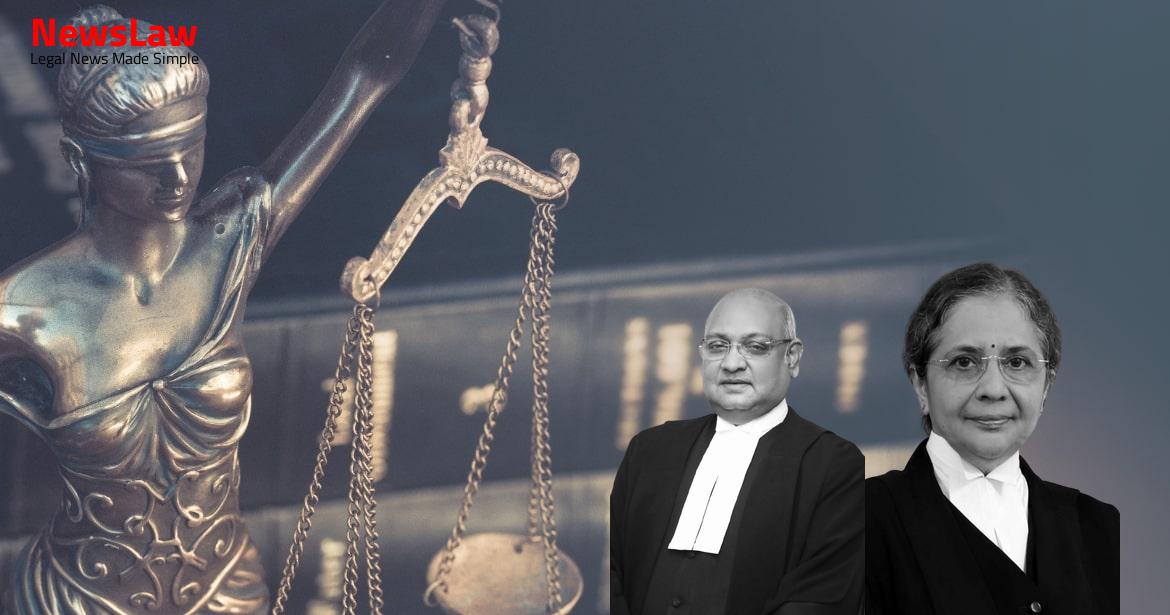Explore the critical legal analysis conducted by the court in a recent case focusing on maintenance rights. The court’s interpretation and application of the law played a pivotal role in safeguarding vulnerable individuals from potential destitution. Let’s unravel the intricate legal reasoning that led to a judgment aimed at upholding social justice and ensuring financial support for those in need.
Facts
- The appellant-wife and her daughter filed a Maintenance Petition under Section 125 of Cr.P.C. seeking maintenance from the respondent.
- Allegations of cruelty, physical and mental torture, and dowry demands were made against the respondent.
- Family Court granted interim maintenance allowance of Rs. 40,000/- per month to the appellants initially, but no interim maintenance was granted to the daughter once she attained majority.
- The respondent denied the allegations of dowry demands and harassment but admitted the marriage with the appellant-wife.
- Dispute arose regarding the paternity of the son, and the respondent’s request for a DNA test was dismissed by the Family Court.
- Despite warrants and non-appearance, the respondent’s defense was struck off by the Family Court.
- The High Court dismissed the revision application of the appellants challenging the order of the Family Court.
- Family Court accepted all oral submissions of respondent’s counsel without evidence from respondent
- Maintenance application by appellant-wife was disallowed
- High Court confirmed the Family Court’s decision
Also Read: Legal Authority and Res Judicata in Representation Matter
Arguments
- Appellant-wife’s version unchallenged as respondent was not allowed to cross-examine witnesses
- Respondent-husband leveled personal allegations against petitioner No 1, justifying her living separately
- Question raised regarding entitlement to claim maintenance for petitioner No 1
- Prayer for time to complete instructions and advise respondent
- Argument about respondent having no income due to closed party plot
- Dispute over wife leaving with children without justifiable reason according to respondent’s counsel
- Request to not interfere with concurrent findings of facts
Also Read: Court’s Legal Analysis on Filing Counter-Claim
Analysis
- Section 125 of Cr.P.C. aims to prevent vagrancy and destitution by providing maintenance to wives, children, and parents in need.
- The proceedings under Section 125 are meant to be summary in nature, ensuring a speedy remedy for those in distress.
- The provision in Section 125 is a social legislation to protect women and children from destitution.
- The primary goal of Section 125 is to provide social justice, prevent vagrancy, and compel support for those unable to support themselves.
- The dominant purpose behind Section 125 is to prevent destitution and ensure support for those in need.
- Recent cases have emphasized the husband’s duty to provide financial support to the wife and minor children.
- The benevolent provisions of Section 125 aim to prevent distress, destitution, and starvation for the wife, child, and parents.
- Family Court’s erroneous order in not granting maintenance to the appellant-wife despite evidence of harassment and neglect by the respondent.
- Appellant-wife’s unchallenged allegations of harassment and cruelty by the respondent were supported by evidence of payments made by her father to the respondent.
- Lack of evidence from the respondent to dispute appellant’s claims, indicating bias in Family Court’s decision.
- High Court’s casual confirmation of Family Court’s order without providing reasons, further perpetuating injustice.
- Respondent’s disregard for court proceedings demonstrated by failure to appear and refusal of DNA test, undermining his credibility.
- The respondent, despite having sufficient source of income and being able-bodied, failed to maintain the appellants.
- The claim of the respondent that he has no source of income due to his business closure was not accepted by the Court.
- As an able-bodied individual, the respondent is obligated to earn through legitimate means and provide maintenance to his wife and minor child.
Also Read: Analysis of Conviction Based on Circumstantial Evidence
Decision
- The respondent is directed to pay maintenance amount of Rs. 10,000/- per month to the appellant-wife starting from the date of filing her Maintenance Petition before the Family Court.
- The appellant-wife is granted a maintenance allowance of Rs. 10,000/- per month, in addition to the Rs. 6,000/- granted to the appellant no. 2-son by the Family Court.
- The entire arrears must be deposited by the respondent in the Family Court within eight weeks, after adjusting any amounts previously paid or deposited.
Case Title: ANJU GARG Vs. DEEPAK KUMAR GARG (2022 INSC 1033)
Case Number: Crl.A. No.-001693-001693 / 2022



